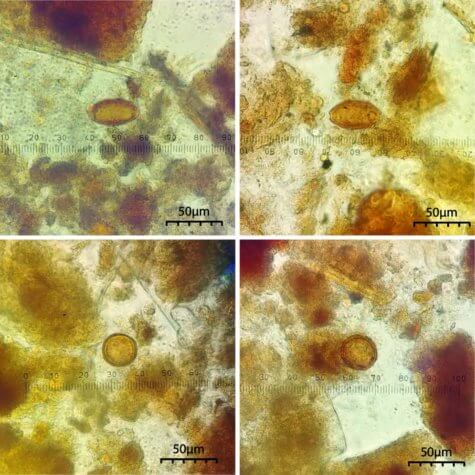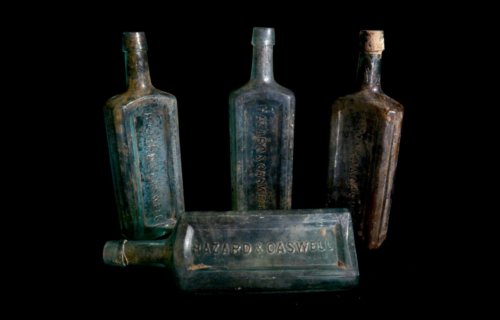‘The state of medical care during this time period was pretty terrible,’ explains lead researcher Jesse Casana.
HANOVER, N.H. — Health and hygiene standards have come a long way in 200 years. While Americans may take things like a working toilet for granted today, a new study finds unsanitary conditions were literally everywhere during life in the 1800s. Researchers from Dartmouth College say fecal samples reveal even America’s rich, upper class suffered from intestinal parasites during this era.
Study authors made the discovery after excavating the former site of an outhouse in front of Dartmouth’s Baker-Berry Library. The old privy belonged to the residents of the Ripley/Choate House, which previously stood on the grounds of the library.
According to Dartmouth researchers, the famous house was built in 1786 by Sylvanus Ripley, one of the college’s first four graduates. Ripley would later become a professor and trustee at Dartmouth. In 1801, wealthy businessman and fellow Dartmouth graduate Mill Olcott purchased the estate; going on to live there with his wife and nine children for many decades. The team notes the Olcotts “would have been among the wealthiest and most educated people in New England” during this period.
Despite their wealth and influence, the study reveals some of the same “bathroom drama” researchers would expect to find in urban and lower income areas. Not only did the team unearth bottles containing digestive health elixirs, but fecal fossils still contained eggs of parasitic organisms — like tapeworms.
“Our study is one of the first to demonstrate evidence of parasitic infection in an affluent rural household in the Northeast,” says co-author Theresa Gildner, now an assistant professor of biological anthropology at Washington University in St. Louis, in a university release. “Until now, there has not been a lot of evidence that parasitic disease was anywhere else other than urban areas in the early 19th century.”
19th century life was ‘pretty terrible’ for everyone
Researchers say parasitic infections were very common in America during the 1800s. Much of this had to do with the growth in population across the U.S. and increasing urbanization. In urban areas, poor sanitation, unsanitary outhouse conditions, and more contact with domestic animals all contributed to spreading parasites.
At the Dartmouth dig site, the team discovered privies also served as a family’s garbage disposal. In various soil levels, study authors unearthed several well-preserved artifacts dumped over the years at the Ripley/Choate House. Among these include imported fine ceramics, peanut and coffee remains (exotic items at the time), and three fecal samples.
Researchers also uncovered 12 Hazard and Caswell bottles. During the 1800s, these bottles were marketed as a cure for digestive ailments — the Pepto-Bismol of its day. Signaling even more stomach troubles for these families, the team also found eight bottles on Congress & Empire Spring Co. mineral water in the ground.
“The state of medical care during this time period was pretty terrible,” explains Darmouth chair of anthropology Jesse Casana. “A lot of people probably experienced symptoms of parasitic infections but wouldn’t know what was causing them. Privies would have been getting a lot of use at this time. If people had the means, they would order special medicines to treat an upset stomach, which were really just tinctured alcohol that offered no medicinal benefits.”
Worms were everywhere in the 1800s!

Gildner’s research focuses more on parasites and the three fecal samples provided a surprising look at life in those days.
“In studying intestinal parasites, I am used to working with fresh material— not fecal samples that are almost 200 years old and practically dirt,” the researcher notes.
Gildner first had to rehydrate the 200-year-old poop before filtering it through several mesh sieves. That process separated out bigger particulates and trapped smaller parasite eggs for study. Through microscopic analysis, results reveal tapeworm eggs (Taenia spp.) and whipworm eggs (Trichuris trichiura) were present in all the fossils. Although researchers say the overall number of worm eggs was low, they were consistent in every sample.
The discovery of worms in New England is actually a surprise, even during the 1800s. Study authors explain that these parasites usually prefer “warm, tropical regions” rather than cold, snowy regions like New Hampshire. Cold climates in general are typically inhospitable to parasites and their eggs.
Money can’t protect you from bad hygiene
The Dartmouth team notes their study can’t say for certain the worm-infested poop actually comes from an Olcott family member. However, they say it’s likely every member of the household was exposed to worms at some point.
“I think that we take a lot of our health and infrastructure that we have today for granted,” Casana says. “Our results show that even wealth could not protect you from these parasitic infections 200 years ago.”
“Tapeworm and whipworm are still really common today in various parts of the world and can lead to nutritional deficiencies, digestive problems, and poor growth,” Gildner concludes. “Although these infections are preventable and treatable, there’s still more to be done to help prevent these infections. Access to clean water, which is essential to good hand hygiene, and sanitation are two things that many people still do not have today.”
The study appears in the Journal of Archeological Science: Reports.
